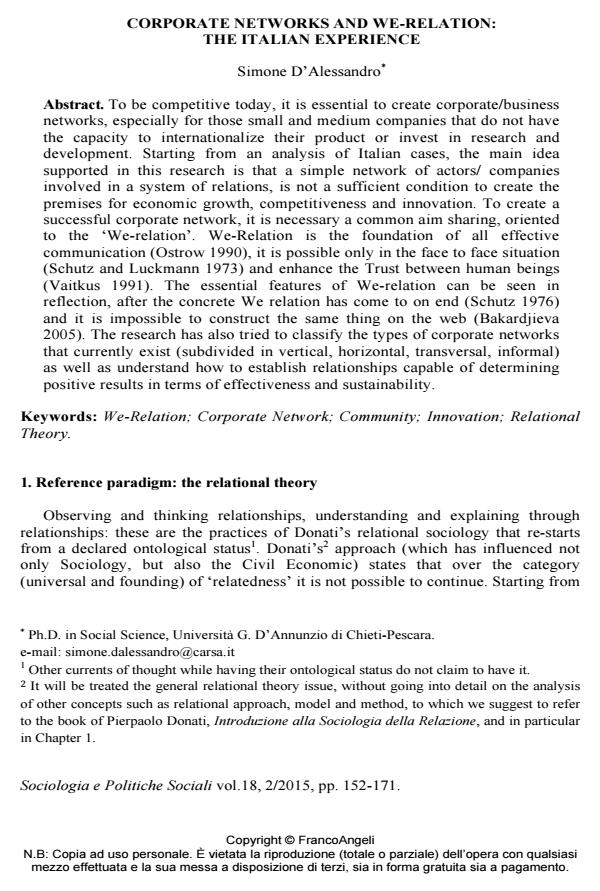Corporate networks and we-relation: the italian experience
Titolo Rivista SOCIOLOGIA E POLITICHE SOCIALI
Autori/Curatori Simone D'Alessandro
Anno di pubblicazione 2015 Fascicolo 2015/2
Lingua Inglese Numero pagine 20 P. 152-171 Dimensione file 90 KB
DOI 10.3280/SP2015-002008
Il DOI è il codice a barre della proprietà intellettuale: per saperne di più
clicca qui
Qui sotto puoi vedere in anteprima la prima pagina di questo articolo.
Se questo articolo ti interessa, lo puoi acquistare (e scaricare in formato pdf) seguendo le facili indicazioni per acquistare il download credit. Acquista Download Credits per scaricare questo Articolo in formato PDF

FrancoAngeli è membro della Publishers International Linking Association, Inc (PILA)associazione indipendente e non profit per facilitare (attraverso i servizi tecnologici implementati da CrossRef.org) l’accesso degli studiosi ai contenuti digitali nelle pubblicazioni professionali e scientifiche
To be competitive today, it is essential to create corporate/business networks, especially for those small and medium companies that do not have the capacity to internationalize their product or invest in research and development. Starting from an analysis of Italian cases, the main idea supported in this research is that a simple network of actors/ companies involved in a system of relations, is not a sufficient condition to create the premises for economic growth, competitiveness and innovation. To create a successful corporate network, it is necessary a common aim sharing, oriented to the ‘We-relation’. We-Relation is the foundation of all effective communication (Ostrow 1990), it is possible only in the face to face situation (Schutz and Luckmann 1973) and enhance the Trust between human beings (Vaitkus 1991). The essential features of We-relation can be seen in reflection, after the concrete We relation has come to on end (Schutz 1976) and it is impossible to construct the same thing on the web (Bakardjieva 2005). The research has also tried to classify the types of corporate networks that currently exist (subdivided in vertical, horizontal, transversal, informal) as well as understand how to establish relationships capable of determining positive results in terms of effectiveness and sustainability.
Parole chiave:We-Relation; Corporate Network; Community; Innovation; Relational Theory
- Sociologia relazionale e rapporto medico-infermiere-paziente Simone D’Alessandro, in SALUTE E SOCIETÀ 1/2018 pp.159
DOI: 10.3280/SES2018-001011
Simone D'Alessandro, Corporate networks and we-relation: the italian experience in "SOCIOLOGIA E POLITICHE SOCIALI" 2/2015, pp 152-171, DOI: 10.3280/SP2015-002008